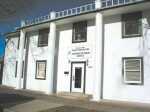School district to ask for supplemental levy

The Mountain Home School District will ask voters this March to renew the supplemental levy it needs to maintain programs in the district.
The district will seek approval of $2.7 million each year for two years, the same as the voters approved two years ago, "so there's no increase in taxes," Supt. Tim McMurtrey said.
This would be the third time the district has sought a two-year supplemental levy since the legislature drastically cut funding to education in 2008, in response to the national economic meltdown. Currently, less than a dozen of the 113 school districts in the state do not use a supplemental levy to support their programs.
"When the legislature wouldn't provide the funding, they just passed the responsibility down to the local school districts and taxpayers," said school board chairman Jim Alexander. Still, those cuts by the legislature were so severe that school districts all over Idaho, including the Mountain Home School District, were forced to cut programs and saw classroom sizes rise.
Alexander said there were rumors the legislature might restore funding to 2007 levels, "but they might not, and frankly, I'd be surprised if they did." If the legislature did suddenly decide to restore funding back to pre-recession levels, the district wouldn't need the levy.
"We can always levy less than we've asked for, but we can't levy more, so we're going this route to be safe," he said.
The school district also is asking for the earliest possible date on the elections calendar "because we're tired of scrambling at the last minute" to put together a budget, McMurtrey said. Budgets have to be wrapped up by law in June but the legislature usually doesn't complete its work until the end of April or early May. Also, Alexander noted, if the voters reject the measure it gives the district the May election or even the August election dates to try again.
The district's assistant superintendent, James Gilbert, not that the proposed levy is designed "just to maintain operations as they are."
If the levy fails, the district does not want to cut any more programs. "We're trying to keep kids in school. Why cut the programs that keeps them there," McMurtrey said. The district, he noted, simply doesn't want to cut any more programs after it had been forced to slash and burn in 2008.
If the levy doesn't pass, however, the district has two options -- it can cut staff, or it can cut student contact days (when kids are in class).
"I don't want to cut staff, McMurtrey said, "because I've already got some elementary school classrooms with 32-33 kids in them, and that's ridiculous.
"But we either have to cut staff, or cut days," he said, since teacher salaries represent better than four out of every five dollars spent by the district.
Cutting days means the teachers (and administrators) take a pay cut, and students spend less time in school.
"We hope the public will support maintaining the student contact days" by supporting the levy," Gilbert said.
The district's original school year was 190 days, but after 2008 the district furloughed teachers for five of those days and administrators for ten. All the classroom days for students have been restored, but the fewer days have meant fewer professional development days, which concerns McMurtrey because teachers need training in how to implement the new Common Core standards and design their curriculum for the testing that goes with that multi-state curriculum standards program.
In addition to the supplemental levy that the district is asking voters to renew, the district also has an emergency levy it put into place this fall when the district's enrollment unexpectedly rose by more than 100 students. That levy disappears in July "and we don't anticipate an extra 100 students next fall," McMurtrey said, so it will not be renewed.
The district also no longer has a plant facilities levy. Although voters had approved the levy every two years for 50 years, four years ago they rejected the levy that helps maintain the districts aging buildings, opting to approve a supplemental levy, instead. Since the supplemental levy is seen by district officials as having priority, despite the need for building repairs, they haven't come back to ask the voters to approve both.
But those aren't the only issues the district faces that impact it's budget.
The district entered this year with a $960,000 shortfall due to Impact Aid money it hasn't received. Typically, the district budgets $2 million to $3 million in Impact Aid funds, based on the formulas set by Congress.
But last year, sequester caused ten percent of that money to be held back, and then, while Congress had authorized a large Impact Aid budget for schools (to cover costs for significant populations of students that live on military bases or reservations), it didn't actually appropriate the money for the authorization, which the district had counted on when setting its budget.
Eventually, district comptroller Cliff Ogborn said, Congress and the Pentagon usually get around to making the payments good, but sometimes the money can be years late, and that's what's causing the current negative balance in the district finances.
"Right now, we're in trouble," McMurtrey admitted. "But we think that will work out in time."
The Impact Aid shortfall aside however, McMurtrey said it is critical that the district get the supplemental levy approved by the voters, which matches very closely the amount of money that used to be raised by the old Operations and Maintenance property tax, which the legislature took away from the school districts in 2007.
"That's the critical one. Without it, we're either looking at cutting teacher salaries again, or putting more students in classrooms that already are overcrowded. We don't want to do either of those things."
"We're asking that the voters support local education -- because the legislature won't," Alexander added.
